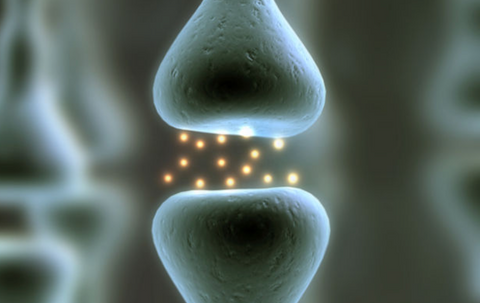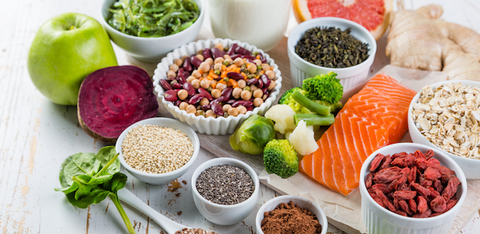
Understanding Neurotransmitters: Impact on Brain Health & Lifestyle Choices
Share
What are Neurotransmitters?
Neurotransmitters serve as crucial chemical messengers within the human body, enabling the transmission of signals across the vast network of neurons in the brain and throughout the nervous system. These compounds are integral to the brain's capacity for processing a myriad of information, seamlessly converting electrical impulses into chemical signals that facilitate communication between neurons. This complex communication system underpins not only fundamental bodily functions such as heartbeat regulation and respiratory control but also extends to the intricacies of human thought, emotional experience, and the execution of complex cognitive tasks. Neurotransmitters are categorized based on their effects; some are excitatory and stimulate neuronal activity, enhancing processes like alertness and response to stimuli, while others are inhibitory, playing a key role in calming the brain and promoting relaxation. The equilibrium between these excitatory and inhibitory signals is vital for maintaining optimal brain function and overall mental health. Among the most significant neurotransmitters are serotonin, crucial for mood stability; dopamine, linked to motivation and pleasure; acetylcholine, essential for memory and learning; and gamma-aminobutyric acid (GABA), which helps to mitigate feelings of anxiety.

The synthesis, release, and efficacy of neurotransmitters are influenced by an array of factors, spanning from one's nutritional intake and stress levels to genetic predispositions and lifestyle choices. Nutrients play a pivotal role; for example, the amino acid tryptophan, abundant in turkey and bananas, serves as a building block for serotonin, whereas tyrosine, found in dairy and certain proteins, is vital for the production of dopamine. At Organic Pharmer, we emphasize healthy eating, recognizing that each meal offers an opportunity to guide your biochemistry towards or away from health. This is why we advocate for a longevity diet. Engaging in regular physical activity has been shown to elevate levels of mood-enhancing neurotransmitters like endorphins and dopamine, underscoring the link between exercise and mental well-being. Conversely, prolonged exposure to stress can significantly diminish neurotransmitter levels, potentially triggering various psychological disorders. It's clear that our dietary choices, the amount of physical activity we engage in, and our methods of managing stress can profoundly affect the balance and functionality of our neurotransmitters.
Delving deeper into the role of neurotransmitters reveals the intricate connection between our environmental interactions and our neurological health. This understanding emphasizes the importance of adopting a holistic approach to wellness, incorporating balanced nutrition, regular physical activity, and effective stress management techniques. Such practices not only support the optimal functioning of neurotransmitters but also enhance our overall quality of life. By acknowledging the intricate relationship between lifestyle factors and neurotransmitter activity, individuals can make informed decisions that positively influence their mental and physical health, paving the way for a more balanced and fulfilling existence.
Glutamate and glutamine
Glutamine is an amino acid that’s used to create the neurotransmitter glutamate throughout the body and the brain. It’s non-essential, meaning that the body can synthesize it directly and it does not need to be consumed via the diet. That being said, we do get glutamate from food, mainly foods containing protein. Glutamate ingested via the diet is largely used for fueling the gut, which means that blood levels of the amino acid don’t significantly increase after a meal because the glutamate stays in the gut rather than being absorbed into the bloodstream. What does this mean for dietary consideration of this important amino acid? It mostly means that the metabolism of this molecule is highly regulated in various parts of the body to prevent too much or too little of it being present in any one organ or tissue, and therefore we don’t need to worry about consuming too much or too little of it.
Glutamate is the most abundant neurotransmitter in the brain and is largely excitatory in nature, meaning it’s responsible for alertness and active states of the mind and body including learning and memory, as an energy source for brain cells, a chemical messenger, a sleep-wake cycle manager, and a pain signaler. It can also be converted into the neurotransmitter GABA. Excess levels of glutamate are related to certain neurological disorders including Parkinson’s, Alzheimer’s, Huntington’s, multiple sclerosis, ALS, stroke, fibromyalgia, and chronic fatigue syndrome. There are also mental health disorders thought to be related to problems with using or making glutamate including mood and anxiety disorders, autism, depression, OCD, and schizophrenia. Alternatively, too little glutamate in the body can result in symptoms like trouble concentrating, mental exhaustion, insomnia, and low energy.
Choline and Acetylcholine
Acetylcholine (ACh) is the main neurotransmitter present at neuromuscular junctions, meaning it is responsible for the ability to contract and animate muscle cells once a nerve impulse reaches muscle tissue. It’s also present in the central nervous system and is responsible for activation or suppression of the sympathetic and parasympathetic nervous systems. Acetylcholine, as the name suggests, is produced from a combination of acetic acid, AKA the main component of vinegar, and choline, an essential nutrient. Note that though we may get acetic acid through the diet, in the synthesis of ACh, acetic acid is manufactured from the chemicals pyruvate and glucose. It’s important to note that choline is an essential nutrient, meaning that we only get it through daily food intake. The foods containing the highest sources of this nutrient are eggs and meats including fish, while plant sources include various beans, with soybeans containing the most, certain mushrooms, quinoa, red potatoes and wheat germ. Research has shown that only about 10% of Americans get enough of this nutrient on a daily basis, so it’s definitely worth looking into your diet and seeing how you can incorporate more choline.
We know we need dietary choline to make the important neurotransmitter acetylcholine, but what about glucose and pyruvate? How are these precursors to ACh synthesized and what essential nutrients does this process require? Well it turns out, in order to be converted into ACh, acetic acid needs to be in an activated form called acetyl coA. To make a long story short, all of the following vitamins and nutrients are needed for the synthesis of the neurotransmitter ACh including: thiamine (vitamin B1), riboflavin (B2), niacinamide or niacin (B3), pantothenic acid (B5), and alpha lipoic acid. Phew! That’s a lot of nutrients needed to make just one neurotransmitter! This synthesis of ACh occurs largely in nerve cells, where it can then be released into a synapse to convey a neural impulse and do its job as a neurotransmitter.
GABA and B vitamins
GABA is the main neurotransmitter responsible for calming responses in the brain, meaning when it is released into a synapse it causes down-regulation of nerve impulses rather than stimulation, like its counterpart glutamate. GABA is synthesized using glutamate, and the enzymatic reaction used to create it uses vitamin B6 as a cofactor, so getting your B vitamins is crucial to maintaining optimum levels of this important neurotransmitter. The enzyme that converts glutamate to GABA is also found in many beneficial bacterial species, which means that eating fermented foods like kimchi, kefir, and sourdough bread, will ensure that GABA production is possible in the body. GABA is also found in green, white and oolong teas, as well as in sprouted brown rice, tomatoes, soybeans, mulberry leaves, and petunias.
Given that it is an inhibitory neurotransmitter, GABA is extremely important in regulating sleep cycles. It’s responsible for helping to slow down the brain in preparation for sleep, and it is present throughout the four stages of sleep, including and especially, deep, restorative sleep. Yoga, meditation, and deep breathing can all act to increase levels of GABA in the brain. Also, as little as 20 minutes of high intensity exercise, like running or HIIT, has shown to increase GABA levels in the brain. Low GABA levels have been linked to disorders of mood and cognition like Alzheimer’s, depression, and insomnia. GABA has been found to have numerous beneficial properties including diabetes prevention, cancer prevention, treatment for alcohol-use disorders, and reduction of inflammation in rheumatoid arthritis, among others.

GABA also plays an important role in the brain and nervous system in that it promotes growth and differentiation (development) of neurons. Neuronal growth and development plays a key role in cognition and the formation of memories, which may explain why increased GABA in the brain can enhance memory. It also plays an important role in stressful situations. Stress can cause the body to down-regulate the immune system, while administration of GABA was shown to enhance immune function during times of stress. This is extremely important today as so many individuals experience chronic stress, which can result in a dysfunctional immune system. GABA has the potential to counteract this process and maintain balance in the immune system.
Dopamine and Tyrosine
You may already be familiar with this “feel good” neurotransmitter as it plays a crucial role in mood, motivation, behavior and cognition, attention, learning and memory. It’s often classified as the main neurotransmitter associated with reward pathways in the brain, meaning we get a dose of it when we consume things like caffeine, alcohol, sugar, fatty foods, and even social media videos. Often dopamine is released in response to a behavior, like eating chocolate, and we get a burst of positive feelings with it, leading us to repeat that behavior again and again to receive that same positive effect. It’s for this reason that dopamine is often at the heart of various addictive behaviors, but we need it for everyday functioning of the brain and body, so it’s important to get enough of it. Aside from reward pathways, dopamine is also responsible for motor and sensory processing in the brain.
Dopamine is synthesized largely in the gut, so it’s important to support gut health with probiotic foods and plenty of fiber. The digestive system is full of dopamine receptors which when activated, can affect changes in blood flow and motility of the gut. Dopamine therefore affects digestion, but also, through these receptors, can transmit signals and information to the brain. This is known as the gut-brain axis, and it is affected by the microbiome as well as the various neurotransmitters listed in this article.

Dopamine is highly regulated in the brain, and it doesn’t cross the blood-brain barrier, meaning that the body maintains a restricted range of dopamine levels in the body. Though dopamine is present in certain foods, we don’t actually utilize it in the brain because it can’t pass through the blood-brain barrier. So how can we support dopamine production via the diet? By consuming its precursor, tyrosine. Enzymes in the brain and the gut convert the amino acid tyrosine into l-dopa, which is then converted into dopamine. Tyrosine is present in nuts, seeds, whole grains, bananas, avocados, apples, cheese, and lean animal proteins. Alongside these foods, it’s important to consume a wide variety of plant-based foods to make sure you’re getting the vitamins and minerals that are also involved in dopamine production including B vitamins, vitamin D, selenium, zinc, and iron, among others.
Norepinephrine
This neurotransmitter is less well known, but all the same it may sound familiar since its name contains the word epinephrine. You may be familiar with epinephrine as a medicine used to keep a person from going into anaphylactic shock from an allergy. Norepinephrine is very similar to epinephrine, and is actually used to create epinephrine or adrenaline in the body. It differs from epinephrine in that it is essentially epinephrine acting in the Central nervous system, which includes the brain and spinal cord. It acts as a stimulant, like epinephrine does, increasing blood pressure, attention and alertness, and it affects the sleep-wake cycle, mood, and memory as well. It’s also secreted from the adrenal glands as a hormone to induce a “fight or flight” response in reaction to perceived stressors. Norepinephrine is the main neurotransmitter used in the sympathetic nervous system.
Norepinephrine is synthesized from dopamine, which means that the same nutritional building blocks that are necessary for the creation of dopamine are also needed for norepinephrine. Gut health can’t be ignored with this neurotransmitter either, since it greatly affects the production of its precursor, dopamine.
Serotonin and Tryptophan
You may be familiar with serotonin in the context of treatment for depression and anxiety. Drugs known as SSRIs, or selective serotonin reuptake inhibitors, were developed to increase the levels of serotonin in the brain and lessen the effects of depression in the body. So serotonin has long been known to have an effect on overall mood and emotional states. Interestingly, about 90% of serotonin in the body is manufactured in the gut, so it's no surprise that serotonin has an impact on digestion and bowel movements. It also affects sleep-wake cycles in the body, like other neurotransmitters, and is even involved in wound healing, since serotonin is stored in blood platelets in the body.

Since serotonin is largely manufactured in the digestive tract, optimizing gut-health is of the utmost importance to keep up healthy levels of serotonin production. Make sure to eat probiotic rich foods, and lots of fiber to keep your gut bacteria fed and happy. Serotonin is synthesized from the amino acid tryptophan, so getting enough of this nutrient by eating protein-rich foods is also key to maintaining proper levels of this neurotransmitter. Aside from these dietary considerations, getting enough sleep, as well as sunlight exposure and exercise all have significant impacts on enhancing serotonin levels in the body.
Optimize brain health for overall well-being
All of the neurotransmitters discussed here are crucial for mental well-being and overall bodily health. The brain and the body are connected after all, and the health of the brain affects the gut and vice versa. Eating a wide variety of fruits, vegetables, nuts, seeds, whole grains, and legumes can offer your gut the nutrients it needs in order to manufacture neurotransmitters like serotonin and dopamine. Protein is particularly important for neurotransmitter production, so make sure to include beans, nuts and seeds, and whole grains on a daily basis if you aren’t eating animal proteins.
Sunlight exposure each day is crucial for establishing a healthy sleep-wake cycle, and it helps produce the hormone melatonin, which is vital for sleep. Try to spend at least 10 minutes outdoors, preferably in the morning, to get a dose of sunshine that will regulate your sleep hormones and your neurotransmitters. Get at least 15 minutes outdoors if it's a cloudy day.
Lastly, it’s good to remember the importance that exercise can have on the body and neurotransmitters. Even small amounts of high-intensity exercise can enhance calming neurotransmitters in the brain, and lead to better sleep. Low intensity exercise like walking is great too, and it can get you outside for that necessary sunshine to boot. Positive habits like these can have a compounding effect on our health. It just makes sense that when we feel better, it’s often easier to make good health choices. Try habit stacking to make small, repeatable changes to your daily routine, and notice the positive effects that can ripple out into your day.

About Author: Stephanie is the current fulfillment director and kitchen supervisor for Organic Pharmer. She studied Neuroscience at University of California, Irvine before studying Naturopathic Medicine for 2 years at National University of Natural Medicine in Portland, Oregon. She also spent 3 years studying East Asian Medicine at the same university.
